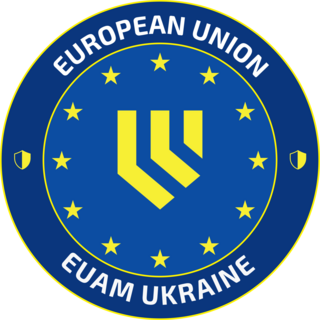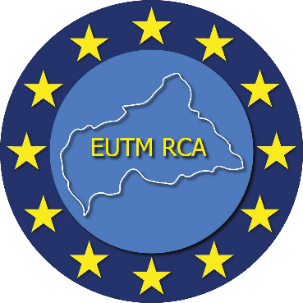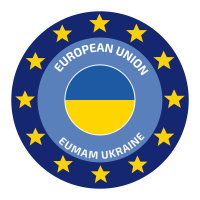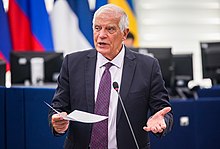
The Army of the Republic of North Macedonia is the military of North Macedonia. The army is organized, prepared and trained to conduct armed struggle and combat and other actions to achieve its constitutional function of defending the independence and territorial integrity of North Macedonia. The army consists of the ground forces and the air force, which are further divided into branches and services. Being landlocked, it didn't have a navy. The army has a permanent composition and reserve forces. Since 2005, it is a fully professional defense force compatible with NATO standards. On 27 March 2020, North Macedonia joined NATO as the 30th member.
Eurocorps, located in the French city of Strasbourg (Bas-Rhin), is a multinational corps headquarters. Founded by France and Germany in 1992, it is today composed of personnel from six framework nations and five associated nations. The framework nations place the Eurocorps at the service of the European Union (EU) and NATO, which certified it in 2002 as one of its nine High Readiness Land Headquarters.

The Common Security and Defence Policy (CSDP) is the European Union's (EU) course of action in the fields of defence and crisis management, and a main component of the EU's Common Foreign and Security Policy (CFSP).

An EU Battlegroup is a military unit adhering to the Common Security and Defence Policy (CSDP) of the European Union (EU). Often based on contributions from a coalition of member states, each of the eighteen Battlegroups consists of a battalion-sized force reinforced with combat support elements. Two of the battlegroups were to be capable for operational deployment at any one time. The civil power that oversees these battlegroups is the Council of the European Union.

The Military Staff of the European Union (EUMS) is the directorate-general of the European Union's (EU) External Action Service (EEAS) that contributes to the EU's Common Security and Defence Policy (CSDP) by providing strategic advice to the High Representative (HR/VP) and commanding operations through its Military Planning and Conduct Capability (MPCC) operational headquarters. From the end of 2020, the MPCC will be capable of running executive operations of up to 2,500 troops, i.e. the size of one EU battle group, as well as 3 non-executive missions.

Lithuanian–Polish–Ukrainian Brigade "TLATAS" is a multinational brigade countries of the Lublin Triangle consisting of units from the Lithuanian, Polish and Ukrainian armies. Other countries are free to join the trilateral agreement. An agreement on its creation was signed on November 16, 2009. The brigade was to reach operational status in autumn 2011, but it was delayed; a January 2012 estimate put that date at some time in 2013. The unit was finally formed on September 19, 2014. In July 2015 the defense ministers of the three countries signed an agreement on the operation of the unit.
The NATO Training Mission-Afghanistan (NTM-A) was a multinational military organisation, activated in November 2009, tasked with providing a higher-level training for the Afghan National Army (ANA) and Afghan Air Force (AAF), including defense colleges and academies, as well as being responsible for doctrine development, and training and advising Afghan National Police (ANP). The commanding officer was dual-hatted and commanded both NTM-A and Combined Security Transition Command – Afghanistan (CSTC-A) and reported to the Commander of ISAF.

The Common Security and Defence Policy Service Medal is an international military decoration awarded to individuals, both military and civilian, who have served with CSDP missions. Since the 1990s the European Union has taken a greater role in military missions both in Europe and abroad. These actions were taken under the Common Security and Defence Policy (CSDP), which is implemented by the European Union Military Staff, a department of the EU. To recognize service in these missions the EU authorized the creation of a medal with a common obverse and reverse, to which clasps featuring the missions' name are attached to the ribbon bar.

The California–Ukraine National Guard Partnership is one of 25 European partnerships that make up the U.S. European Command State Partnership Program and one of 88 worldwide partnerships that make-up the National Guard State Partnership Program (SPP). The California-Ukraine SPP is one of the most important and progressive partnerships within European Command. Ukraine's size and strategic location make it one of the most influential countries in the region, thus making the SPP a key factor in assisting Ukraine as it develops it budding democracy.

The Armed Forces of the Republic of Poland, also called the Polish Armed Forces and popularly called Wojsko Polskie in Poland, are the national armed forces of the Republic of Poland. The name has been used since the early 19th century, but can also be applied to earlier periods.

The Military Planning and Conduct Capability (MPCC) is a permanent operational headquarters (OHQ) at the military strategic level for military operations of up to 2,500 troops deployed as part of the Common Security and Defence Policy (CSDP) of the European Union (EU) by the end of 2020. Since its inception in 2017, the MPCC has commanded three non-executive training missions in Somalia, Mali and the Central African Republic, and will organise the training of Ukrainian forces on EU soil.

This article outlines the history of the Common Security and Defence Policy (CSDP) of the European Union (EU), a part of the Common Foreign and Security Policy (CFSP).

This article outlines the defence forces of the European Union (EU), which implement the EU's Common Security and Defence Policy (CSDP) in CSDP missions. There are two categories of EU multinational forces: ones that have been established intergovernmentally and made available to the CSDP through Article 42(3) of the Treaty on European Union (TEU), such as the Eurocorps; and the EU Battlegroups, established at the EU level.

European Union Advisory Mission Ukraine is a civilian Common Security & Defence Policy (CSDP) mission of the European Union. It aims to assist Ukrainian authorities to reform civilian security sector. It provides strategic advice and practical support to make Ukrainian civilian security sector more effective, efficient, transparent and enjoying public trust. EUAM Ukraine works with a number of law enforcement and rule of law institutions of Ukraine, and it formally began operation on 1 December 2014, following Ukrainian Government's request.

This article outlines the present structure of the European Union's Common Security and Defence Policy (CSDP), a part of the Common Foreign and Security Policy (CFSP) based on articles 42–46 of the Treaty on European Union (TEU). Article 42.2 of TEU states that the CSDP includes the 'progressive framing' of a common Union defence policy, and will lead to a common defence, when the European Council of national heads of state or government, acting unanimously, so decides.

The European Union Training Mission in the Central African Republic (EUTM-RCA) is a European Union multinational training mission headquartered in Bangui, Central African Republic.

Operation Orbital was the code-name for a British military operation to train and support the Armed Forces of Ukraine. It was launched in 2015 in response to the 2014 Russian annexation of Crimea. It provided training to over 22,000 Ukrainian military personnel before it was suspended ahead of the Russian invasion of Ukraine. A successor, Operation Interflex, which involves a larger, British-led multinational training programme, was launched in the United Kingdom soon after.

Hervé Bléjean is a military officer of the French Navy who is currently serving as the Director-General of the European Union Military Staff since 1 July 2020, having been elected to take up the role on 22 May 2019. He previously served as the Deputy Commander of NATO Maritime Command.

Security Force Assistance (SFA) a term originating in the United States Armed Forces for military adviser assistance with "training, equipping and advising allied or 'partner' militaries to enable them to defend themselves without 100,000 Americans on the ground to do it for them." SFA is used when improving the security of the host country aligns with the national interests of the donor country. It may be used alongside or instead of larger commitments of the donor country's military personnel and matériel. This means SFA can provide an alternative to large-scale operations if a war becomes controversial or politically difficult. Given the ending of the wars in Afghanistan and Iraq, with US-led multinational missions to train and equip the militaries of weak states for counterinsurgency and counterterrorism purposes, the US have increasingly shifted towards SFA programs that make host-nation security force more capable of conducting Large Scale Combat Operations (LSCO).














